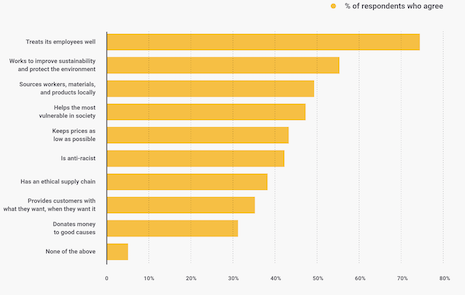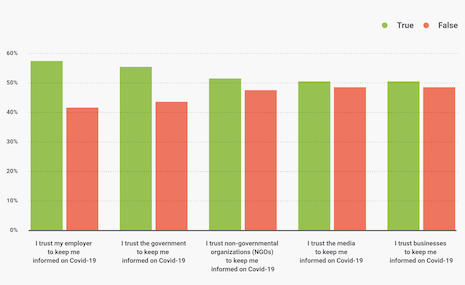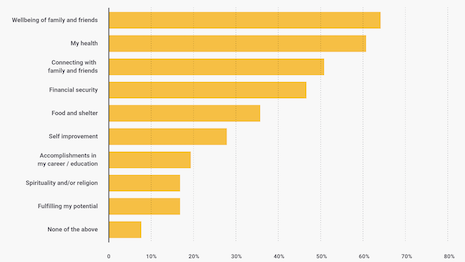Since the pandemic hit, consumers are prioritizing the wellbeing of family and friends, health, social connections and financial security, and brands that are looking to connect should be focused on purpose.
Consumers want to know that the brands they patronize are doing something to help address the issues that they care about such as the environment, social justice and the pandemic. Indeed, they do not want to shop at brands that are not taking a stand, according to Brandwatch’s 2020 Purpose report.
“The pandemic means that everyone is now in the business of saving lives – even marketers,” the Brandwatch report. “The accompanying global economic downturn is causing widespread terror, and decisions must be made under crushing uncertainty.
“Black Lives Matter protests are highlighting the need to address structural racism, forcing execs to address difficult questions about diversity and inclusion," he said. "And all the while, the climate crisis continues to worsen.”
 Consumers expect to create employees well, to improve sustainability and protect the environment. Image credit: Brandwatch
Consumers expect to create employees well, to improve sustainability and protect the environment. Image credit: Brandwatch
Brand purpose
While brands are trying to keep the ship afloat, the language that they use with the public has had to change. For instance, the word profit has a bad connotation among consumers and brands should not be vocal with such language.
“Profit may be a positive word for business leaders, but among consumers it has increasingly negative connotations,” the Brandwatch report said.
“Looking at a year’s worth of social media mentions of words like ‘profit,’ ‘profits’ and ‘profited,’ and comparing volumes to the year before, negativity and negative emotions are trending upwards while positivity and joyful emotions are slipping downwards.”
Instead, consumers want to hear brands talking about their values and how they are taking steps to make the world a better place.
“They’re far less concerned about more performative actions around those values, like getting press coverage or sharing statements about purpose,” the report said.
For instance, Adidas saw the biggest spike in brand mentions on Twitter between July 2019 and July 2020 with its #ChangeIsATeamSport campaign.
The campaign included collaborations with influencers and other brands to help promote positive change in local communities around the globe. Adidas used the platform to promote its Superstar sneakers and saw an increase in sales, illustrating for luxury brands that cause efforts can be financially rewarding.
Notably, Brandwatch also found that employee wellbeing, sustainability and helping the most vulnerable were more important to consumers than “keeping prices as low as possible.” Even as the economy has retracted, consumers are still valuing brands that are working to create a better world.
Consumer needs have shifted to more basic needs and fundamental concerns this year, per the report, and this is changing shopper buying preferences. The report compared values in April and July and found that health and local sourcing are gaining in significance.
“Now, consumers think that items being healthy and locally sourced are even more important than they were back in April, and numbers were fairly high then,” the Brandwatch report. “Meanwhile, they’re even less likely now than in April to care about an item being branded. Loyalty to specific brands is in peril in 2020, and the picture is getting worse.
“The most successful businesses of 2020 will be those that can marry their strong purpose with the needs, preferences and desires of consumers. As we’ve shown above, those preferences and needs are continually changing – analyzing them must be an ongoing process, not a one-off.”
 Consumers trust employers and brands more than the government when it comes to COVID-19. Image credit: Brandwatch
Consumers trust employers and brands more than the government when it comes to COVID-19. Image credit: Brandwatch
Building trust
The report found that consumers are more likely to trust business and employer safety measures than government safety measures to keep them safe.
Brandwatch pointed out that this data point is complementary with recent Edelman research that found that consumers thought their employer was better prepared for the virus than their country.
“COVID-19 is the most pressing global issue of the year, and businesses are in a strange position within it. People are relying on their logistical competence, their messaging, and their safety measures more now than they could have previously imagined."
The data also revealed that consumers see businesses as they see the media and trust companies to keep them informed.
Interestingly, people trust employers more than the government to keep them up to date on developments. And consumers value brands that take care of employees.
“Keeping workers safe and well informed is not just the duty of employers, it’s what’s expected of them,” the report said. “Breaches of this fundamental understanding of the role of the employer, especially during dangerous times, are likely to be harshly punished by consumers and commentators.”
While the future remains uncertain, Brandwatch found that consumers expect COVID-19 to continue to be a threat into next year.
At the same time, 57 percent of consumers want businesses to focus on sustainability and the environment more in 2021. Black Lives Matter support is also important to 37 percent of U.S. consumers.
“While this may seem low, recall what we said above about how consumers want action more than they want performative indications that a business supports something,” the report said. “A business stating they support the BLM movement is one thing, but acting upon this support is another.
“One way businesses can make a change is to improve on diversity and inclusion internally, and we’ve seen a massive increase in interest in this in the last few months.”
 Consumers trust employers and brands more than the government when it comes to COVID-19. Image credit: Brandwatch
Consumers trust employers and brands more than the government when it comes to COVID-19. Image credit: Brandwatch
{"ct":"pR67+xn6b10b9JHDAHCcQRxYoASxv0Wq6FA5qBL0TwzASZcMdhKGDnvDyBZW7eFi2XPhVLhtB0Ksf9TT6vGorMNr8QO2OdyX4VNiSdVZg3gkEACgP4dD8m4EpKS++ivXA+crcb7UqRaSa9Iaf58UfGIcVB8m+J9PQVgKMvaLHLVAJj8BNBOpRS2+0+0rmYg2f+ZcwPI0kYuexDhQuFVr1sOyGr+\/kaMM1FbYe3lLHjY+D+BzUZE8vuUsIfY5JMca\/qXZZcH3q6kmZJg17A2Obq53DvWh9UNiUZZxPnu34Eck5bcY\/4hHIpTGkE7kDXwIsP9kd3lNQjlWkDGgw+lcvR3cgOeGpn2KpwEW+dQIKHqUuMgcxXeL6Wb175+Gdl5ZEj5CF+\/AK0s8oPaPVWFbX3dUN7x2GhnoHT\/qZsXWby1FT+4XJSQXCvmxYq5L4uLCT1mv3h+84Et37hOrWZ\/DLClHQI2zXYfjmjoaB43Jtv3L\/XKex\/962B5tuLg4RgwNM0+OgUZVqBGQguk7NOc4Rc+yJerG6jr9vSiaRfe+FU\/oN77pwf0E\/SdjULVSjRv6jXX1rkrUAmsDYUQ0enWZ0OBrS3XUqojmE68YUC7RRxOX\/45S4ERDwmWQOxBD+bNac\/DvCCAwfikcUx4Ror1+rU\/aowAEA0dzpMjtHCItx7az9\/VN6l+H5Tn+sUUgS0n1ri4HiciXpt6Nygb8btXyj4pftYZg2NgXoirFO32EB17fAZvbNfMI6aowdTTmFR81E3L1zGr4GM99MJseI7US8Nx3QlO5njRXR3UrLMtEGC62dnUgQuPkXJ1p5F8p5EFkVn0OxKmqLGyYjRZ5uUPZ8sR25CIZAzIlzrivnMelUhkhVpD6T9FBZEvefFO6wjqQA6eiyaI1oVz0hVsIW35Gq255YtzOkuHcq8WLirS7+Uf\/XYpgZES2eoCHr1qno5U6QCI4Ztc9YExhhw3ZGIGN3ItuseNUVAWioyyF0BNqeYX5b4S3yPK2mA3KImeS12xuj5neC4Uu06jXQG5gU\/YA55tEDheC4Dg0Lo1\/iuviSwxs6LUa\/7SyybtnYZsjefmlQYWPXTvBCK3NKoqSv4SlVRzN59e+oz2bX4OblUPlzxrT2CHm4Jzk1yRZ+TnCUD+HbEbsnpEIiuGDka4gtR80mZhQn3SIFsl5hrNoieZm++q7LCywIPCyUakNinC9t314smxkzsJUCCip+yb0T3Y6LX7NIvp9a1tW2+oQV3CIfIhgPjvWVtzGeZW\/Dx0POC4I2wYJAqMH4avnAdCWh6w40wckyrq3Id\/S2iYS0Cr1T5cJNnHePcqAJZjhoMngy\/eV2q46whER6tvxxhBKxD0YlfiVKRUyDCDOf4V8N1EJTy23djfuYweHWmW7Z5u6\/4P1LGOpZ9UQc9i0T5SG5Qme5mtbLY62k10kun0wSeX3szkbggHx5E5uoSZDazeCltfa9PFnwIwlUPsdRviPg61q9J2+GOMjH8maMXr8ZOdBtPQcjkPafDmHtkql7WCX9zWT\/i1l5gSxePnSbHrpLmWThfnEPimWL0yQt+2Rr2ptBmp4kFiMltRMZbhDIJ4jBMqnOqHtM9A550h4x4sEwt4bf3zoMZNNHTuhoCoJQ5jRmU2ju0ykq3ngmJ6zEAxEbZIToFLCK9kOOFmm+ueE5Vz8uRdekXqRylF1G6bb+yPvfGSKH\/G+FE63WWN8d+xwfA4dPTF+XEOb\/CWIqSSOqgITBQufK\/UsTliIlZPQNcKkncoR8b9wg6Gh47DjmB8RjJ6dEOYQBk71BrIwa9gFpnWJ9Objj0S\/mYbb3ZoeEq6fqpQIldWQNNfZ3WVjBfk5taqZoxcaiVevM2UiVPvy0YMPqsnFul8dNaJfBtPQC7VSkWIZZnFYJ6f8hxi1E2c3G94cNBoGJrx8cFok7\/kKvHqzpwTDOcbwMCAXkk1O4d1X9\/SzHg7tb7fnCNFUXoFSodPknALabOboLDr5vblqQKlW82aj7Pta9dkjr\/bM2vwDDLh3VWeY+GHJM+BT7sTtJY1qkp2YEr8eoSmVxkFV1vF\/H3BZ0CCWCA2FGL2DkGNs1JvoMzt8eC4WpDxPXEyexGC5q2OkOIxVQyfNfbStTEns+g5PGIxwgjl51GRgMmg2wGlPlDq61drzvVZ1QHKUNkQ5K\/Qy4lapS0eaR5R\/AR01RJNZP+i3CKM9N38F8GMN6hgz010cDWt6B2VQ+QjKn7DSjDVYkvDURlr3DQ7RyDSduHXbe62C1GPKFKezvo4JkoLEyhfNY6xtfqyqhWdlO1ApWqhvuLvjsJu5np\/hBVeoKbyNdjtiFBfV7Lo0acnDdUmZNysm67UmRcQEMt+DwETMoOLOyxne5Pjh24kRjuqWlIFRhizedDf2Z4xoEwfqqMMGpfmQMXvm\/1lQVa95gVQxQDrIlsL724SLss6sDhd4zE377UKYSlELh3E26oBLWGC2gSOYdu+fxHKtPkqLG1E\/jV\/t8jBeoQnzAGPp5Vhl70yOpiSctFAIjeWA3EDsqcKPh\/PmC9ElJPss5112afoUrJJlTGY7\/oSd70ljdL5NjUnak8qcX5mm2aoOfyIE2I99d0pRmjXFq2T\/PdTKFiaHQwljLZiT5fzSzi6Y4wK6fUdZkWeoGbfLyMtwHF6mBy1um14wO1TbbmxyIJ7dA0YPWFGKGqWyyoeKpDYjRBC6XXh1QpJCLGqcf8jAJe+uBNR7QKKw1OOa+CrGFmKew4l8\/Th+agn9YPvxHB2weHwu9DEc7ZL8odgYm2ikVf5dVSwzvaT0T0W7JdI0fQUx23Ff1VW6RQAFHpGdRSYN3DOcRHgc4MA4eQ0l1SNcAeYP2Tf43R8jCVwUUaZRQ5zG7oGxMKzgDFs8jdwODsYS6WWgljFJDqhOV9YpiAlLVVzWYJJWIKAy0Ru6Ae17wnBDjmUNZ\/pf28OkzjawvZW8TwVhTPnANXA7uPb\/30Dzi3Kcg7xEoZZ2yqtit0e0NHjhfddFoaNsbWp1o5TmEfZzwdDIghHTmlYvD0fCX3\/13FSPIFsXXf+hldImM87yFrzM9yT\/R3NVO7Nw0\/uR\/C4z2Tc\/TKzJABaEkc\/0X1znCGfxxcVVIWTve0XqhnVhbHi6oL83YDub1N7ldO5oLWSg75\/Ss7Q0XFqtiQ8OxrEoqj8L3Yj8+l76eA4U8pYUKURTMZ+PaPNeuSw2uiovRphVRb3KmmP6ZWLgM9gTziCTr8D09CbNmFu88tvRCQuMpWQTXMPKwukmWs+tZnb+oQXStiOGU3S6UaxgL8n\/XmrqwlBKKu8pKozX1TVNH6G0Xw\/WzkLPmJaX6LWlmitYWha+H+gOmsfvhQ\/GSgfEEkcJjXWbdb6pEFUFdeLyHrKq71ZFOTQGEvlO81X\/pE9XJh9L2x46\/\/cPRRw72pMUz0TT58maKtm3MHVbPXHufxOjvgDVTll7+y25HHhboBnDF1JiG+9qz0ODCdxLW9pcTyha0Sid31BSSUlrF9xgftGIfIYBXCShBkT1T7wupWXOwnA9LE\/nt07MyGaArwC8Ei\/wuYXek4Qryeqy5dv0e0QMlFsxWsdX4lSQK+Nt5K9d\/1DgQSol5NE6OIJX0Wp6tFTtuRK3pImFB125QtYQnVqBh2iZsHiLC83\/wVPsZTCNQzr04w\/QwTqjDSGmtmXhx3+W096j8mB\/USVkO+mTD+36RE0Lp1ptDZ6nXGnF99b7QP+JytvQi7TG73M5G25dxHwXlsZPR05Yxt\/zOaqRxJpX0cWndsT7WEfEnBKb1IsdWmHdpfB+O3MhXnr9xQLTYXo6XJbbYfzbMS7J3q7L7wp4k7c5NQL8oV1aKKTYzrrTZlj2pJNBjAgacRXqs1nYe9ZH6RxoOCsi2RqomdFtHFLIt4XEA+GXlDQYqEB5d\/9sI9TS8GGo4glnPea0BWXKXVd0KMBTh6ALtWypu3W\/G8R6Sh15nRGBQ6CmmEvD+zbxhw3VfmbIsBMQOy6jgbmuGnoIfWLjzqTIRHySPJOmamNrlLOQcVG3LL0C35HlcNat99auxEmzaXEuDTunVJJeZ8AAZXRZfpdtbt90SjtafzDCd8MVgp7RqOsMUf7iSy1ijK2infHcbiVBzmMcLQbyOxjglDfYGx6n+PLHCmy1vWkSJJwBFnbMIaIFuuxi3uleJshA4+h7H73zyGFV7\/b4WiVhOkirRayObvbifhlfkL1nFc2yBN\/XQsngWaGMLAytxp+tfpP6Ke0DlU\/6PP6y4+UMGhKXGphLeZRSiafVQMpNnV9DYGGSWzkbuxohuoNTQkN8Ho+oNDpoo0s34T4CPA6du9hFNOydvdvFfl5QMKdDdHvVo7Mc4ii4mNm7ANfVJ7ZpOMAWwqlsclxnQxDDrnTQDVfV0+hcKcIQz5lSD51bYMp6HHIOIQFcbOKKdDvj1\/EhqpQ+bj1RDt8MqtqgJ9C2WHT1HL3cvzrIsSquJtVX9td2fPWyqXpWzi4KZCtWM4XkkB4nr1ExIMNvT2ov1jUeynu8DDPaT6jnVmO\/jZ+odQI517eHNwDf\/MDNK8lq\/l99JBC9FfUShITHMEouz7ndFjEbIx794KECNzh6k66gBmC0ipVQ2MK4LK67He4i0w4JYTBIGVoZX9+f2Vdg5f7hEyEXtyI7tYKlCt3IGPI9Wrt8QLKm4Tpua4cmapYR51hgL7PFFjUpA0gi4JusfRJTeRJmAsesB3mry4jAQfnN0T4hKqg0QmPPltHiPnfCrlW0RxGDDCNDWGFdRm2j3TndfLz5k94vRb7+KptrWJrEeA2XVP9m\/EN9d2CX\/Y3JcMtjphS3MxW7FDuO888VJ5cSnc+\/LZzY471jqY2iBaQNw\/TFS7kTpduE5hbrkure\/8LeufWhHGYCst3w4kn+dIG86dkO2FAXLNRlcxFoKmNYiF+0YiN9WlEYLmRjK+d5TkVAOma6I\/PF2CjvdU5VVPuSiZKdzSWis2D7yV0CMZUxz7HGt\/9FLXs1GZQ0hLVXJYhhazGuYU9W4cOJLyCR6qZMK6q1tX1p7fa9OpxcRHsWFvB1gmCb1QbHukti1hE\/Qo62Qg53uCRe9Uh85LazWF5axQU06Wx7zcsxc8vWUumIaSFgFAbys0CUhlXDYcL7yhE1Oqni74B62Cd10swyVqYUx7C\/27Gi9h56ebECyfuqJHap4fRWdIQCTJkTMWp6eWqANw5bRpwivicYCqfsV4u5\/lN9b6L2uNZl4yLylJTWZxgUq56dsC6CFm4sHo3vLFANy2lwPYpKYCtCPBd9rX0oX25wlOmfZThDXyNNXrUi0SLzMWr1ODLef7mszywsXtE2DqBCvMxSuE6H2TohK1WTTieIgo066HID4RlctEgW2n9TzJHWsLtdB9fG\/R4Fu+R9wKxFoCeNFBjnN0JHjx1qULQvuQN4Amkgw00W+WkoChx7192FiguHL0LJv54MvolDEgtj03GxruOHRolaN4yKulk+c8p2qutI4f2w+OUGk6+GqojxkKLBsVophZjIzMMGCg2TV6SAaz1xT0EnjEyhIBIRzKDggzfrugObwgK3g8D5v3ZSpR2uHyj2jNL9g9dA+d8fa73YeWU1cPu05RAk2PWDAkrMbrv0h9vy+fzmdWK5OEkM+3i5ji4mevAtQDY2tJtWNzf29xWlEskcy75lXz\/N7SOH4CYUCb8ackaO5ek1J3oPj9Qy\/qGg44D6K2PbWvVcZQBrUf8XeyBlL9Flge9Dqt1OZd2zEbjUGZkfbWKStMHZZp7inDZUya8Cgx\/9ThoTFy9GxneNCGGNlANFCtqsS8h040miup2Uvxqch0DL\/8+SV9P1jlqgVKCuKRU8NKZBABxdPMrbmztz5An1WgAaldcTflCCHbhpEEGnyPs3t2D\/SWpy7ZgEX1AKHDh9\/d0LNUQ8USN9bL\/L1UUd1Q1k4sRCCPR0fOI6xfmd7IBhz7dKFEer4RSPUUbCugGZwU\/SbLIDh+jXpPyR8IJazVjedwMl3Df8BvuZb5GOZF4D9AyBwtB94MmmgWNj1hZ6PYqbYnSQl+EhfS8ZjZ6F5cjKhzgB3jJ2pDcTcuyRJr+8xsON4qbWW\/SGS6KeaLVEUNtCXAhKnAV1mmcmHkJguvkW4MdUXksZUGFxwYn+Wki4DHKwlSVw0EajzJMYZurxS690yhKNYyoT2w75fyM7kgpORMfCl1BKKQoW+HXTqIpcPVBb3dkyo6HLMHeNytWfLnkD4jcqXlLetpwpWy8s\/Fdr31hqUlLlh2C7djng\/+00tqHIrJraHmnLMW+WKixYllsJDwa5Mq4dbzHNEaCIze4mULDHoSBrVdXRuXyQX0CCCQreUNtnWpV0\/M6Au9B2\/7SxQcjEDG5br3JE6wCwL2chg8BAuZtfeJF7nfvQp2YHKyZwynB4w3IAPi\/112atu52xoPJM1Y0TqxdPVlrKLJ0ioMTCAPsr8+8EcYzindsBHSjVqn25O+y1Ewb+a4dWdg+5z7ThD7GVmRe59lUYbNG4t4cGEGxE0L6yVXt9OVyy5DiOwud2UNo1t6Zl7Kn8ao9tWQLswPdEE22XoveGCLHZ71KGh8rGCi31TtYt9dpFNh1aOJTdH6SLkGDAflAG7o6e+FIo\/cx3v7Z8qFrhM7Einkac8iPjVG45fPyaI1\/a1Hi8l73AGUuj417VPtHurv\/zTCJAwMUlkObdoJUd4ML0a9vfhQRxWyZKbwEoOuOhhBTLaQ24ahz5JN4Ig3nNdEVZ1JWNzghJa6lKfqL0ydj4ASudH0jpyUHoGuQmwmoGQFcC4PgoYrL4+MnxvfI2KYJkjhM9O9X5fqDWPixQ2c90byE0bu2v5Fns1ORi5LQT0B0eJDyTOFpz6O59PEpFlUQZsu6hoVHkCcrP9\/8P4z+7J\/et8x3EP5SvaqbwFX7\/FplZZ0FLB2oSDUoXadHa7mIHcuXoiBuR2or886yNylW7HSwdhaXQmNSoHKgn6UYb9gjhCFfTPZQN4Vl\/xJZDsqQnXPsM2GvVYIBiyKpLgkY9OY8+HuyR1DC2pirHkxxBeSaEp7TIYTpa\/ffeSHm2+7FcdHZ36lIdLvhrcSnaP3TS+0Pi\/Xw7+YiWnjm5e40lj8YT5OTimCPZhgn3jmEA\/93oabV6BEi7LDXIiD08nhCxa+Ehe2mHhGk0HjT5tdI3NbpZSW3QKkFi3pBHXjG1Xpo+3FXTTp5MgHMgPvy8gTWstTfv9SkignC2ATm51VLawZrDINVwOwHPuvTbZp1Tvul31BrlpeiuXsNBJYNWZIw6tl6XlW2qUnojULzqwsEIX9JQiTBIOSFvUukOuGivD\/d+5VWWKDn03xWl7chs6ZUPgCN93E6LJXQ8Mt\/ERPHPrwhYSvhB0q3sV+vxBJonhmK9nigWSHrW3qXkTZkxFxWH97ksVhk2C\/fNHPnGiSjJ4evFYLN0n9y0Z0dLcA5bXez18pIR0IrlY1Os0P4CKMyl8sY6oS7PzjE\/s8ymf3RLG2lyQf4zskh+asggtgh58wUKPpr9D\/kI6rN3EoPadNz16+YJIS9lVhVrXuszCa6TPwc3jExAk6BF3FLoAgV7jzOvTqLLDdDKRS1KysUG2gFpuIFv9vep6QXs1EajWudgCaoXQgRS20REPBpJz6D7gL1zTAT4\/Y7QR6ECn+Qfc6tVj1f3DmxKZa17Nl1vAbRhoDD5YFwPkAyRfoY0o3yBKTvAiA6t0GzfEg19f6yE6yDPYRGaTRRZfM8iZVuwnOJphJsbWiCeU9hcHkBgKgrHKy7cEVedxhC1HIjmSTvtk7VbjYgAH\/w2v+8XADdDbIBSHzBne92YjrD14Hd9XEsVGwWMsclVDmDyyKLHyrqm6XyHxb5GPZRrEZDdhIrq\/LOlj86BYtONNwiJUJTIQxn0Sn2SOYQ5dFby6tbdeHgGnBfgkZseEln1VHop7xdfrgE6mnbufLyZLjnlL6Jzkfc92tlhXOCn2cQqVnYySZfGXPBiDK0gUpfICwY7WNFHFBAL9PwEocLJqDEZGLPmPCoMeEdfKyhBxWxA9suUqD9C1JhweUYSwKTPaWd9HdnZyprAffGWPKC5+mn8JyeXKXaigja58F3ja1CLM0S0jtiQv7aj1f4ERgH1+yR7r7uPy1t5UqSD7RTZ2QlGnXugTNoJcgijvWNmOWkzcHBuXu5knT07P2N0BEMOh6d6UvKpzM0k7a2Yd3gxzhabWyyAdFMmaFISR3Y25SDV\/p17RsQj2vD0fb3hfv90oj2nZ2ZdCdHdt6sFS4ITIMX42AFfOn4LN0aju3Y4oGU+PsvBktf7HrByag9agboTCY5n19NYkkc5\/SKbTzmt2UUZrBnvW8MfEx810Yf6Q0i0ykc8OBILnMduG1At00C0bc+N1Q2VEf7vf08l\/gDbZUPu72d00C9esobgldsQbdYWewmjeEDTfNx7qmvvpPUEm1l5bdegYtX4qxmTdUG\/Qr9w87tG4sHsgRda2ma4z949Zp+6OQcQdBqPohy4jGZ\/qvf+6bG3wYfFCBWoi8uLYUJRXg\/\/Sp2M41bTCB+YMf+mhhslbLPZIyCNs7CJH+uiFBcWoaTDPhU9tfT3xjx8caoPE6FZD8LvTQRhrWW+hHBfuestSbJlljYh7PwxWywSOxn660VDbmiJdPEKuJRNj0YG7buuYc\/rb\/EmCPzanaAWdGVw4nCXF\/ADRNuuJD0kvb2FU7lAdOJsN2IXOYbZqrgQM+lKb2nDq5vVG0Br1qhAO19jqmiHbTvDupIheyFN142gK57f9nAS9K3PEq+JbvFzf7tUsPv2K8C6kyszcfLzRMWKKbqwJm0JGCiLW\/nvpH8Ho7jOeHrp8QZSiWnbiVNcV4OD0i6qXjeKpOcgMIIVf0RhdF+DVNwk4x3Flfkf9b\/sHnD8TRjrRcaMaECkqs0hDmqPdpVgwf3JovAIC1eE72cd888FfOR8wkqGhb2OE1JD\/roAIsN9uz9MIyNU+YMXTa5Lu0RQhVJpsPjFF5FDpUVOxWeNtnUVGumWwzeIUUPEOnmZNgsJ0AEl4shNzpa5TEXAu\/aB5t8DZePTgRkMooGD1LZJMYSeVCxdQU+Wci\/iXeQf8ZJaYiv5qqQJoP1uRV9D7cn8eS4Nl8RWVfMm7pA5zLFf3C5n0FuJlOAvPuSGyS6L36bdflHbCuPsNfxxzosO6hW3BF9Q1Xd\/goIndgxHHwQqenznJ6sxclBkV+q1KBzLslhFBn54T5ON53zydUDH4f8aAVnzwhsdFE+TsrSN7tN3H7sqsNJ2aLuErWllVVDF554zNC9HkHg2DGYjy4YVhuOKN+Cu2LQPYw7fHO8aBrUusLrF7rrX9x61Oaz9tbQaR1XXL1v\/scDF9y9+o+XOrByVQI2DPkNdeH\/tbk+OBet\/QjhviCIIt0QZwtWY8VL1H8eoRwgGhiie4mKIqVP19b5\/lBjoqz6o3zi9rPZw9L+OrKb9DuUHcWV\/Qxk5+1SxVI5\/ER03320O7GNxNTF23lXr6t9Jhl9q1nE9uEnGots6FkkfKnFj+NLOihsHsCnGInJRQm7VVD7bsg8cou82rzK9ltoawaA9qSDxCI4h7zY3bxwe9dUYXFE0TLF\/FuJ3CrTM8j0igYXjMxtVIn3VzcFnY020bmG1XGgt\/2lRTFrReM+7Zm\/HZkXOLlnMKEvSBGBIBwkZbfXZbQs\/wj1MMrB5dLdRk0RizdreZ1lX6ok2L0nM+o+AVKy3fKppW3zUhBzhsCwPPgXFt9Xw9XirBNdm6AbTorGP0TIrolTmVcis8GTlmqH1Qz6lH\/wdcwi73OMdIv4GtkjWTx75JACRGF4B0sSxHwB1HxK60fCq4KFFD65GSeHMa3ar9RjSZN6YV9kOL1nNBsMalkVoUri31C5EhxKjmy5j6oE0y53G9e2s4NeTMWiPNcZ+\/Qr3f5gGKVJ14ATYc+mOEx16X+aVSuyywffsAGtqKqBOnox1JGw+d1+YGcZub4HVBoI4ntYQnfXGPxVbTjWVewNgvKevBu1irDhTLmgAqE4032ntQ+Edm+50qykcx7suJTpchugtRdUHdoXr2QJ19diA1Hr5S35ujUUGxAXMjrObJ3TAanZFZcmV4x9SZg9RmtlWJmd6rvjS1rteE5rpnyjBe0KVQ6+DN5p2JLLcLR3CgywvcI1BA2xOys0tAJjlbDzuK2o4JJyLI3arG3ZW+PCVdhnTsAnrl8VxBAYGEuCQAj0AbrMxwRLjE4f0JsNeGP49xeNzO3yG8hBEIIMlaua+efA9scmiAn64C\/0yxBCiHvmHGoNRnyNAVe0tdTFrXzz25jb0iElH4T9Od9PCFcMM6qOpvkuHl0XhBliTbT4Bkc2LGAR7kOBybDsDgjje\/RvlZnMbcO3IZaSY0qSk6IcvJBhvOJJiUDNFxlvhD3v6fxUHS\/+boOZ8wcakAOTQA7O+Q+hM5Ul5I0FpRLoSJJwUb6O3ccoiDeTFu7unOUBciEmN6UQQ5XeF4xnWuFB6P3ZH02rguzdkrdtO0pVcZ3aSf8GemzZEb6dLY4oa+upZ1PgHIW9rGij0eZPZOFuGIPB43BD\/ym9Qiw33JNdlMEQE9GImfixA1M9rn8uuXvN0k3GLgsFX135Zp08hYJdlE+1BxkA5tOmcwv0OehfDonoKxC5Bh\/4o8WIUjbTJD\/h\/vZlJ0xsnInXq+Fw55VOuR8ENXPz8hqwKa4Ewu4bU72rKtphpWjY+AVN3K4AASwP65uKUw+Kltl8X5nUASoloARQrXcg\/e4luXKbVNcyxGEH75D2DuIIvOasOMg\/NwlaBVycDhNbye1JqUF+0IEqQ3+5JKIbFlufcsyFG2gbTQLVZ+8mXhW+X6Z\/KMjwYu2fqV4JADhK+hZ3sPb6ZfOBP5bZJ2VffYu0TrGMeE6HDrjVUN1v1uHaF7hMvDZEI\/Gc5Ut+pS+WD4tHOH+tjVTgpv8fvrEMflgxaXLIAZkZIYmLzIZn653K7EYXgo8SgqU4jDmIs\/KwjWbw9SeeQSA24Y88c4oNVbvjHX2mhBvzqA3Re1CXATe7Oe9z4nnodiW6u6A\/Jc3HB9jbgIvddwB59FOt0xuIEcfNoGn4v","iv":"d4a645aa97fc8c64ba431b846546696c","s":"bed75f82a35934f2"}

 Activities that consumers are prioritizing this year. Image credit: Brandwatch
Activities that consumers are prioritizing this year. Image credit: Brandwatch
 Consumers expect to create employees well, to improve sustainability and protect the environment. Image credit: Brandwatch
Consumers expect to create employees well, to improve sustainability and protect the environment. Image credit: Brandwatch Consumers trust employers and brands more than the government when it comes to COVID-19. Image credit: Brandwatch
Consumers trust employers and brands more than the government when it comes to COVID-19. Image credit: Brandwatch Consumers trust employers and brands more than the government when it comes to COVID-19. Image credit: Brandwatch
Consumers trust employers and brands more than the government when it comes to COVID-19. Image credit: Brandwatch